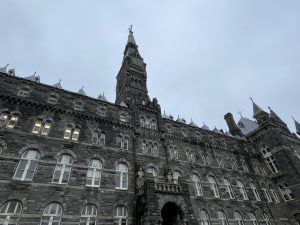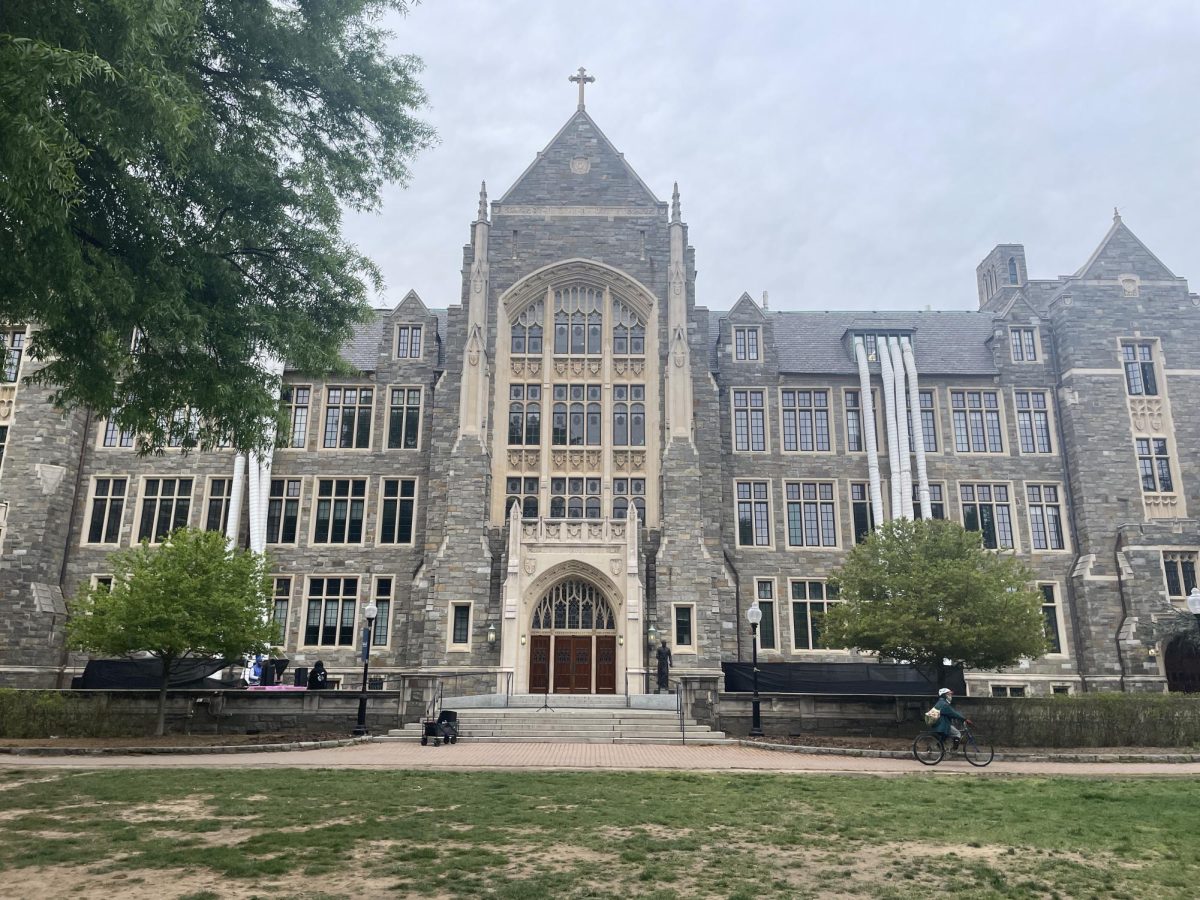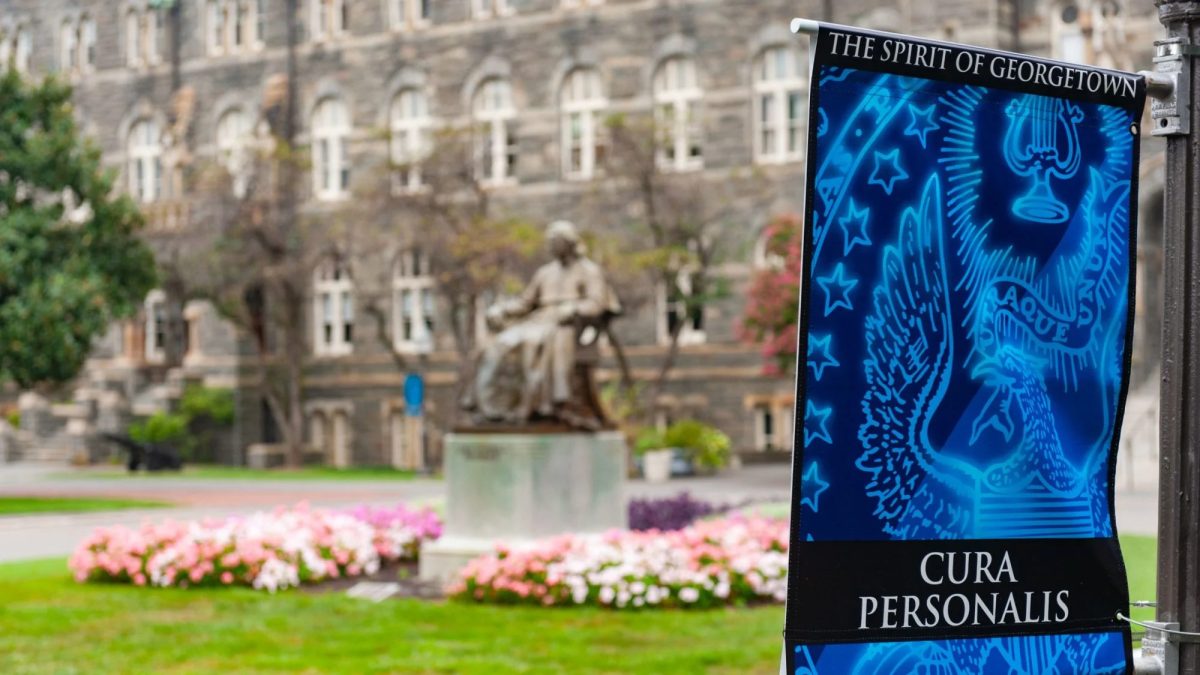The Georgetown University Student Association (GUSA) Senate approved a resolution, 23-4, to hold a referendum on whether students support establishing gender-inclusive housing at an April 2 special session.
The referendum, which will run April 11 through April 13, will ask students whether they support Georgetown “establishing comprehensive gender-inclusive housing,” including allowing students to live with roommates of different genders and having the university ask whether students would support LGBTQ+-identifying roommates during first-year roommate selection. If the referendum passes — which would require a simple majority of students to vote in favor and at least 25% of the student body, or about 1,625 students, to vote — it would provide a sense of students’ stance to Georgetown’s Board of Directors, which oversees the university’s operations.
GUSA President Jaden Cobb (CAS ’25) said he, Senate Speaker Megan Skinner (SFS ’24) and Senator Ethan Henshaw (CAS ’26) brought the referendum before the Senate because they felt the university was not moving fast enough to establish gender-inclusive housing.
“Some of the things that they’ve been giving us have not been sufficient to get this policy done, so it’s time for us to fight for the 6,500 students that we represent and really be the voice of the student body,” Cobb said at the meeting. “Referendums are used to push the boundaries. It’s our strongest weapon as a government.”

The referendum proposes that the Office of Residential Living adds a question to first-years’ living preference questionnaire asking whether students would affirm LGBTQ+ roommates by Fall 2024 and establishes gender-inclusive housing by Fall 2025, according to the resolution.
Senators Julian Jimenez (CAS ’24), John DiPierri (SFS ’25), George LeMieux (CAS ’25) and George Currie (CAS ’26) voted against the referendum.
Henshaw said many transgender and gender nonconforming students currently do not feel comfortable in living situations because they feel pressured to share their identities.
“Right now, if you come into Georgetown, especially as a freshman and you’re gender nonconforming, or you’re transgender, you have this choice where you can either out yourself to every roommate that you talk to, which is something that you may not feel comfortable doing, or you can risk going random and living with someone who’s not supportive or affirming of you,” Henshaw said at the meeting.
J Gertin (CAS ’26), a student who plans to vote in favor of the referendum, said the vote represented progress on a key issue for students who identify as LGBTQ+.
“I think it’s a great step forward, especially for people like me who are nonbinary and genderqueer who need to be able to get good and equitable housing on this campus,” Gertin told The Hoya.
Henshaw said other Jesuit institutions, including Gonzaga University and Loyola Marymount University, have adopted gender-inclusive housing policies, citing research that GU Pride and GU Queer People of Color (QPOC), organizations on campus that support and provide safe spaces for LGBTQ+ students, compiled.
Fordham University, another Jesuit institution, also adopted gender-inclusive housing in 2020.
At the special session, Jimenez raised concerns he said he heard from other universities about students being matched with transgender and gender non-conforming roommates without their knowledge.
“There were some women who complained that the university had them living in an apartment or a space with someone who was biologically male, but they were not informed of that by the university,” Jimenez said at the meeting.
Senator Olivia Mason (CAS ’26) responded by saying that implementing gender-inclusive housing would not force students into uncomfortable living situations.
“The goal with this referendum is to make sure that all students feel comfortable in their living space, and that includes cisgender and transgender students,” Mason said at the meeting. “That doesn’t mean that cisgender students are going to be forced to live with transgender students if that’s not something they’re comfortable with.”
Liam Moynihan (SFS ’25), who serves as GU Pride’s director of advocacy, said the referendum would ensure the Georgetown campus is more inclusive.
“As a genderqueer student, Georgetown’s housing has truly failed me, but, over the past months, I have been inspired by friends, faculty, staff, and administrators to imagine a Georgetown where genderqueer inclusivity — in our housing, curriculum, community, and beyond — is the norm,” Moynihan wrote to The Hoya. “I believe that this referendum offers us a chance to unify our campus in pursuit of this shared future.”
Senator Sam Lovell (CAS ’25), who works as a resident assistant (RA), said the change to gender-inclusive housing would make more students feel welcome at Georgetown.
“As a freshman RA, I think there’s a population at Georgetown that would take advantage of this and would find it to be promoting a more inclusive environment on our campus,” Lovell said.
The last GUSA referendum occurred in November 2021, when students overwhelmingly voted in favor of abolishing the GUSA Senate and Executive. However, the referendum fell short of the mandated 25% student turnout.
The referendum on gender-inclusive housing will occur simultaneously with GUSA Senate elections from April 11 to 13, which Cobb said would promote turnout and make elections more accessible to students.
“Having it all in one election is so much more accessible, and also, for getting people out to vote, we see our highest turnouts when there are social issue referendums,” Cobb said. “I think that’s just, overall, good for the general consensus of GUSA.”


















